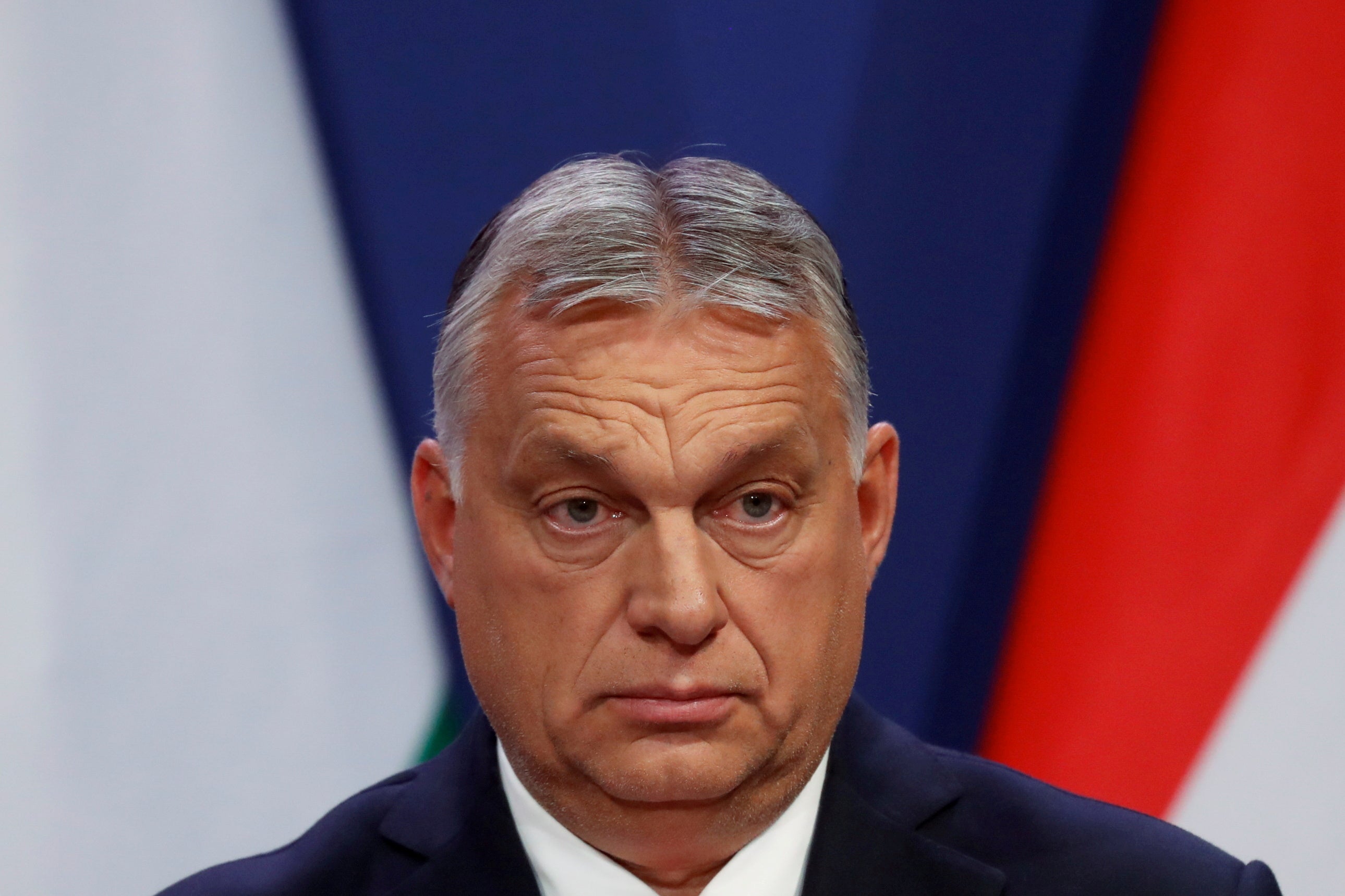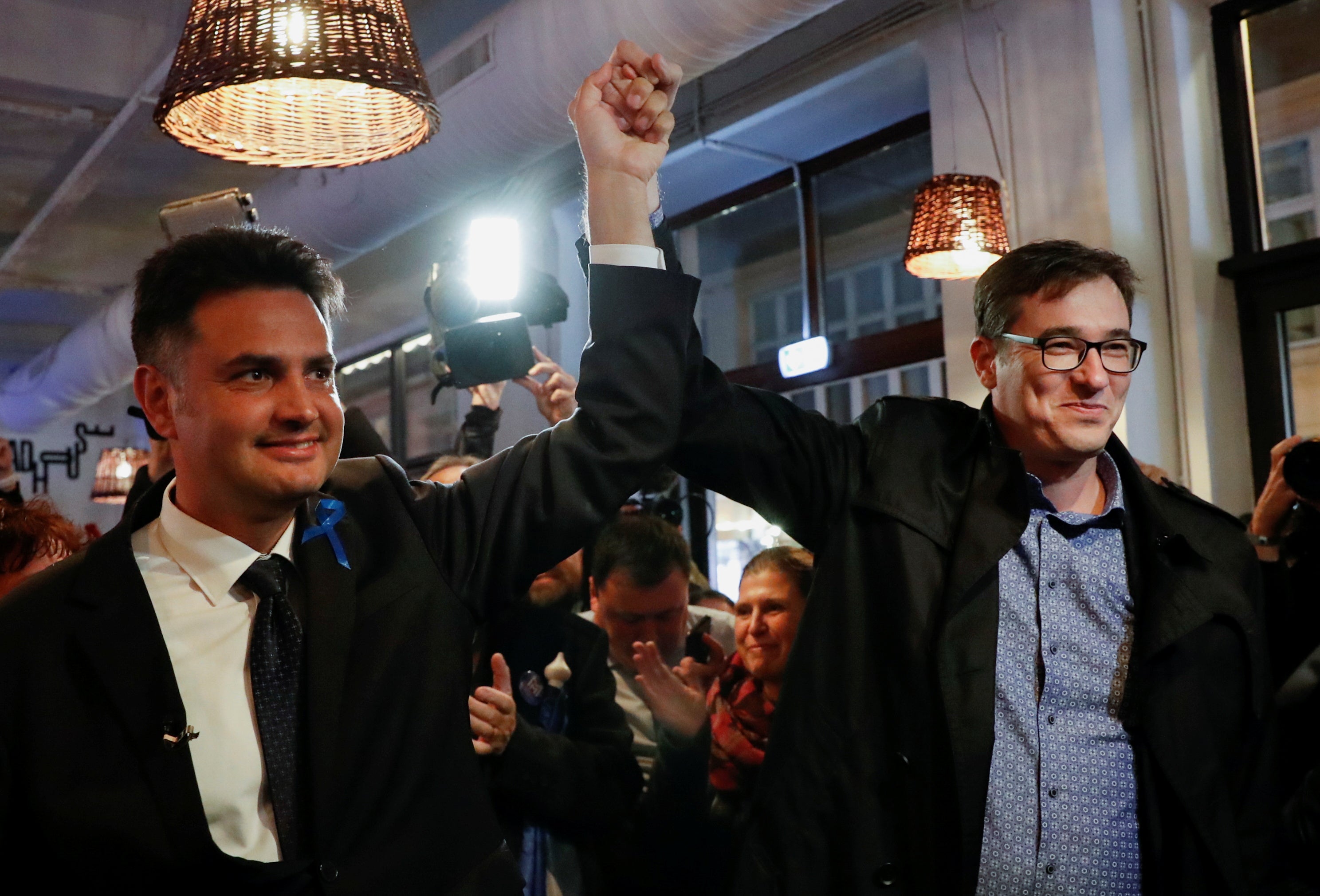Viktor Orban walks EU tightrope as Hungary’s election race hots up
Orban may have to temper his anti-Europe rhetoric as he faces an opposition candidate cut from similar cloth, reports William Nattrass

The European Union has become a “rainbow-coloured shadow of itself”, and “if it goes on like this, it will waste away like the waning moon”, if Hungary’s leader is to be believed.
In these surprisingly poetic and poignant terms, Viktor Orban took yet another swipe at Brussels during his Fidesz party’s annual conference in Budapest last weekend.
Yet after his uncontested and ceremonial re-election as party leader, the prime minister insisted that he does not want to take Hungary out of the EU. His unusual speech indicated the tricky balancing act facing the Hungarian strongman ahead of 2022 general elections, which could prove Orban’s toughest challenge to date after more than a decade in power.
Orban emphatically said the Hungarian government does not “want to leave the EU at all; they can’t get rid of us so easily”. His stated aim is to ensure an EU of individual sovereign nations, rather than a “United States of Europe”.
This marked a notable shift in rhetoric from the self-styled defender of Christian values from migration and western liberalism.
Earlier this year, Orban was strident in his criticism of the EU’s democratic deficit, even suggesting that the bloc needed fundamental reform in order to survive.
Europe, meanwhile, looked on in shock as Fidesz brought in a “child protection” law in June that banned the dissemination of pro-LGBT+ content in public spaces accessible to under-18s. Orban more recently expressed support for Poland’s defiance of the legal primacy of the European Court of Justice (ECJ).
The Hungarian Constitutional Court is now hearing a similar petition against the supremacy of the ECJ, with Budapest arguing that EU regulations on asylum seekers run contrary to the nation’s Basic Law.
In this context, Orban has often seemed determined to make the threat of a so-called “Huxit” from the EU as real as possible, conscious of its mobilising effect on Fidesz’s core voters.
“The way Fidesz sees it, they have more to lose by softening their touch, resulting in core voters staying at home, than they do from alienating centrists who are few in number and concentrated in urban areas,” Gabor Gyori, from the Hungarian Policy Solutions think tank, told The Independent.

Still, most Hungarians are wary of “Huxit” because of the huge significance of the bloc for the country’s economy: 82 per cent of the country’s exports go to other EU countries.
And ironically, the latest EU public opinion surveys from earlier this year suggest that 68 per cent of Hungarians are optimistic about the bloc’s future, higher than the EU average of 66 per cent, and far above the 53 per cent recorded in France, one of the key drivers of greater EU integration under Emmanuel Macron’s leadership.
Another recent report, compiled by the Slovak Institute for Public Affairs this September, found that Hungarians have some of the most positive perceptions of the EU in central Europe. About 59 per cent of the population see EU membership as good for the country, according to the study – a higher proportion than in fellow Visegrad Four members Slovakia and the Czech Republic.
"Fidesz’s years-long anti-Brussels campaign has not really dented Hungarians’ support for EU membership, although it has lowered support for specific EU policy decisions or proposals on topics such as migration," Patrik Szicherle, policy analyst with research institute Political Capital, told The Independent.
Such considerations may be partly responsible for Orban’s shift towards underlining Hungary’s commitment to the the bloc at the Fidesz party conference, an environment in which he might have been expected to instead stoke anti-EU sentiments.
Changes in the European political landscape could also be putting a new complexion on his tendency towards rebellious behaviour.
Orban could go too far – he is playing a dangerous game
The departure of German chancellor Angela Merkel from politics is symbolic of growing tension between conservative and progressive forces in Brussels. Merkel was often the pragmatic deal-breaker when relations between Orban and other leaders threatened to snap, conscious of the enormous economic significance of Hungarian production capacities for German industry.
Indeed, the newly elected leader of the Hungarian United Opposition and Orban’s key challenger in next spring’s elections, Peter Marki-Zay, said there were three reasons for Merkel’s lenient approach: “Audi, Mercedes and BMW.” Hungary has rolled out the red carpet for German carmakers in recent years.
Marki-Zay isn’t shy about speaking his mind – and the rise of this conservative small-town mayor may be another factor throwing a spanner in the works of Orban’s well-oiled anti-EU propaganda machine.
The election candidate is a devout Catholic and claims to speak up for the concerns of rural voters who previously felt they had no choice besides Fidesz – a persona which makes him hard to dismiss as a stooge of western ideological imperialism.

Facing an opposition candidate cut from similar cloth, Orban will now need to walk a tightrope when discussing issues such as EU integration. As a viable conservative alternative, Marki-Zay may be able to tempt away Orban supporters if the threat of “Huxit” becomes too real under Fidesz.
“Orban could go too far – he is playing a dangerous game. Yet the opposition has not yet exploited this risky aspect of the Fidesz campaign,” said Peter Kreko, director of Political Capital.
Speaking on Friday, Marki-Zay said that if elected, he would the reverse the closer ties Orban has pursued with autocracies in Russia and China, and improve his country’s relations with the EU and other western allies.
Orban may therefore attempt to focus on domestic issues instead. He has already made lofty economic promises and doled out tax breaks, while Marki-Zay is promising reform of a political and social system that he says is skewed in favour of Fidesz and its allies at the expense of the Hungarian people.
“What Orban really wants is not the EU, but a free trade zone giving him and his cronies lots of money without asking questions. What he offers the EU in return is cheap labour, tax incentives and access to Hungarian markets,” Gyori said.
Orban might not be fooling anyone with statements about his commitment to the European Union – but facing a real threat to his leadership in next spring’s vote, he may well temper his anti-EU rhetoric over the coming months.
The future of Hungary may hinge on whether this delicate balancing act can be pulled off by the brash and bold figurehead of the European right.






Join our commenting forum
Join thought-provoking conversations, follow other Independent readers and see their replies
Comments